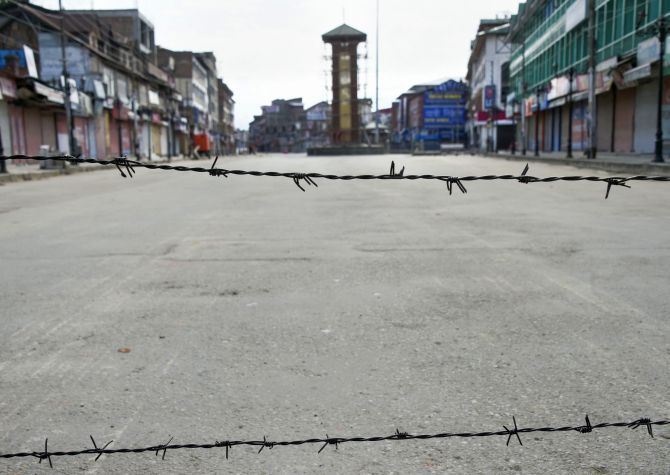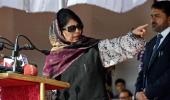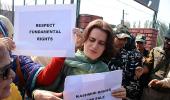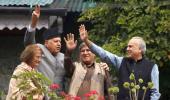'The politicians waiting to grab the space left behind by Omar Abdullah and Mehbooba Mufti do not have any credentials,' says Athar Parvaiz.

Ever since the Bharatiya Janata Party-led government in New Delhi abrogated the semi-autonomous status of Jammu and Kashmir under Article 370 and divided it into two Union territories of J&K and Ladakh on August 5, 2019, politically aware citizens and political analysts in Kashmir have drawn several conclusions from these actions.
One, by downgrading Article 370, which had already been thoroughly diluted by successive governments in New Delhi, the BJP rejuvenated the political sentiment in Kashmir which had lost steam in recent years.
Two, Pakistan had almost forgotten about Kashmir and was deeply involved in dealing with its own economic and political mess, but the BJP reminded it about doing something urgently about Kashmir.
Three, India, thanks to its democratic values, economic might and diplomatic capital, had created an aura around itself globally which has been dented by the August 5 decision on Kashmir and the events that followed.
A political analyst, who preferred anonymity, cited a parable while arguing that what the BJP -led government did on August 5, 2019, was "least warranted" and that it has certainly not resolved the Kashmir issue which, he said, still remains unresolved.
"Once a man found a dog drowned in his well," the analyst said. "Worried that his well had gotten impure, he rushed to a religious scholar to ask how the well could be purified. The scholar told him to remove 40 buckets of water from the well which would make it pure again."
"The man did the same, but returned to the religious scholar disappointed, telling him that despite removing 40 buckets of water from the well, the water still smelt bad. Upon this, the religious scholar asked: 'But did you remove the dog's body from the well?' The man replied in the negative."
"The scholar then asked him to remove the dog first and then draw 40 buckets of water from the well; only then would purity of the well be restored."
According to the analyst, this is exactly what the BJP has done with the Kashmir issue.
"Article 370 has been removed, but the Kashmir issue is still here. It is a matter of time when and how Kashmir erupts again with citizens demanding political rights. Pakistan may also throw up some challenge given the hard efforts that country is making now," he said.
Another political analyst, who also spoke on the condition of anonymity, said the only interesting thing he sees in the abrogation of Article 370 and reorganisation of the state (from a Kashmiri's perspective) is the lesson for Pakistan that it can't afford to rely on its traditional modus operandi on Kashmir anymore and keep on staying as a stakeholder at the cost of lives of innocent Kashmiris with its actions yielding nothing for Kashmir.
What is currently under the spotlight in Kashmir are the charges under the Public Safety Act slapped on two former chief ministers, Omar Abdullah and Mehbooba Mufti. They were booked under the PSA in the first week of February when four other leaders -- Naeem Akhtar, Ali Sagar, Hilal Lone and Sartaj Madani -- were also slapped with the controversial Act.
Another former chief minister, Dr Farooq Abdullah, had already been booked under the PSA in September.
On February 15, IAS topper and former bureaucrat Shah Faesal, the founder of the Jammu & Kashmir Peoples Movement, became the eighth leader booked under the PSA.
Most people in Kashmir feel that imposing the PSA must have compelled leaders like Omar and Mufti to realise what common Kashmiris have accused them all along of -- not making sustained political efforts to safeguard Article 370 while in pursuit of power and failing to protect human rights in Kashmir for years when both State and non-State actors created havoc in Kashmir.
The common man's argument: Both the National Conference and the Peoples Democratic Party as the main political players in Kashmir were supposed to safeguard the interests of the people of Jammu and Kashmir and protect their rights, but they miserably failed to do so.
These political parties participated in elections and made the people come out and vote and, therefore, should have given Kashmiris political dignity and security in return. But they kept enjoying power at the cost of Kashmir's political dignity and future goes the argument.
"We can't blame Delhi, it will do what it wants to do. We were ditched by our own people. It is so shocking and insulting that the clumsiness of our politicians has got us to a stage where we have been declared as a Union territory," said a shopkeeper in Lal Chowk, Srinagar.
That is why many Kashmiris, rather than show any sympathy with the duo, mocked Omar Abdullah and Mehbooba Mufti when the PSA was slapped on them.
Sarcastic comments like 'As you PSA so shall you reap' and 'I brought PSA, I sowed PSA and I inflicted it on myself' were posted on social media as the people felt that when these two leaders were at the helm of affairs in the state, they did not abolish this draconian law and oversaw extensive use of the PSA against Kashmiri activists.
On the political front, the people of Kashmir have similar grievances against them. Mehbooba Mufti's PDP is blamed for bringing the Bharatiya Janata Party to Kashmir and forgetting its political ideology of self-rule. Abdullah's National Conference is blamed for not pursuing its agenda of restoring the autonomy of Jammu and Kashmir.
Both the National Conference and PDP are blamed for adding to the political mess in Kashmir by plunging into electoral politics at a time when New Delhi needed these political parties to build a different narrative globally on Kashmir.
These accusations aside, the long absence of these politicians from the political landscape of Jammu and Kashmir can prove disastrous, at least for mainstream politics in Kashmir.
Currently, Kashmir's political atmosphere is an apocalypse.
The politicians waiting to grab the space left behind by Omar and Mufti do not have the credentials to face the public and create a peaceful political atmosphere in Kashmir.
It will be in the interests of all stakeholders to initiate a meaningful political process in Kashmir.
Now that New Delhi has disrupted the status quo in Kashmir, it will be interesting to see if it allows the churning of the past six months to throw up some pleasant surprises for the stakeholders.
Athar Parvaiz is a Kashmir-based journalist.










